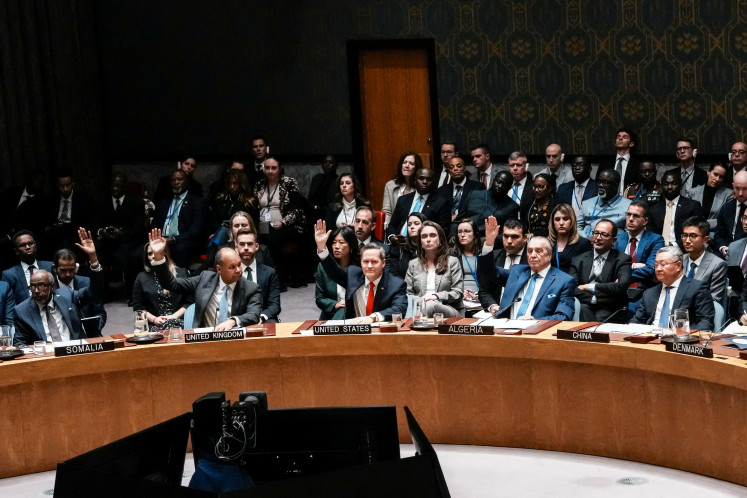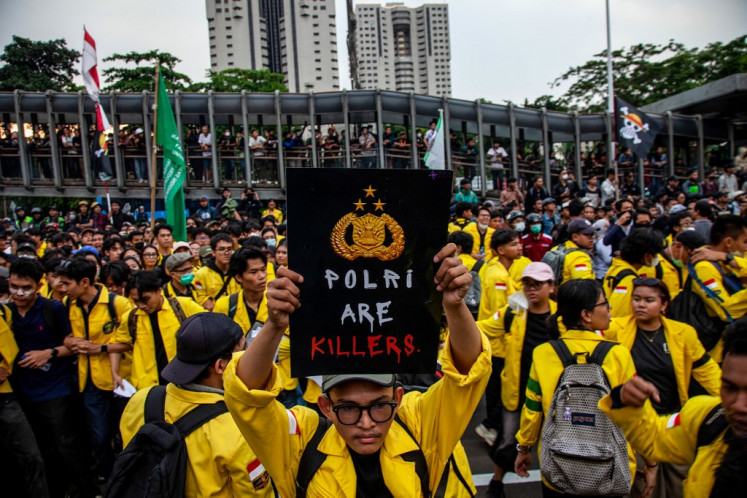Popular Reads
Top Results
Can't find what you're looking for?
View all search resultsPopular Reads
Top Results
Can't find what you're looking for?
View all search resultsWhy Darwin must (not) go?
At the end of the second year of the Indonesian President Susilo Bambang Yudhoyono administration, the Cabinet reshuffle issue is heating up again
Change text size
Gift Premium Articles
to Anyone
A
t the end of the second year of the Indonesian President Susilo Bambang Yudhoyono administration, the Cabinet reshuffle issue is heating up again.
In fact, the criterion for ministers surviving reshuffles is now much stricter than six months ago. Performance remains the main focus, besides other factors such as the alleged involvement of ministers in corruption cases and other personal problems.
The Cabinet’s lack of quality has been there from the beginning. Remember the difficulties of ministers who proposed programs during their first 100 days in office?
These programs did not seem as if they were crafted by ministers. President might have put in a serious effort, but he was neither clear nor explicit in terms of follow-up measures. That was enough to show his lack of managerial and technical skills.
Ministers who have received a red mark from the Presidential Working Unit for Supervision and Control of Development (UKP4) include Darwin Zahedy Saleh, the energy and mineral resources minister. The public also thinks that Darwin has not been working at an optimal level.
What is wrong with Darwin?
He has made two mistakes. First, although it is a relatively easy task, Darwin does not know how to publicize the ministry’s achievements. There are several reasons why he has failed in this regard.
He does not understand what kind of achievements are needed, he lacks creativity in terms of reporting and within his ministry there’s an absence of people possessing the courage to openly evaluate the ministry’s performance.
He has become a firefighter, focusing too much on routine problems. The fact is he cannot extinguish the fire himself.
Darwin’s performance can also be gauged by the absence of a change in culture within the ministry. It is essential to create a work culture that is effective, productive and efficient with clear measurable parameters in terms of quantity and time.
The question is whether over the past two years Darwin has promoted this change in culture within
his office?
Second, Darwin is neither responsive nor quick in addressing energy issues such as the distribution of subsidized fuels, plans to increase the basic electricity tariff, addressing the national oil and gas production target (currently unfulfilled) and so forth.
He is insensitive to issues that could be potentially explosive in the future, such as energy security, which includes the mixing of fossil fuels and renewable energy.
The problem lies in the lack of an energy vision. This results in the implementation of a poor strategy.
One of Indonesia’s many future challenges includes its energy needs, which will increase in line with the growth of its population and economy while fossil energy reserves continue to decline and will soon come to an end.
It will be disastrous for future generations if an energy saving culture is not fostered and renewable energy avenues are left unexplored.
It isn’t difficult to be inspired to work for the energy ministry. Everything that should be aspired to is already embodied in the ministry’s vision, mission and functions, with clear guidance from the ministry’s road map of national energy.
An energy minister must do three things to guarantee success.
First, the minister must possess a brilliant vision, enabling the minister to run the entire ministry and resolve current energy problems while identifying those of the future. Supported with a realistic and measurable action plan, the person in question should also be able to measure the achievements of
subordinates and should be responsive and sensitive to energy issues, while anticipating the increasingly complex energy issues of today and the future.
Second, a minister must have a strong management style. The minister should be able to make changes precisely and quickly, such as reforming the bureaucracy and so on.
With three more years remaining in the minister’s tenure, the person must remain focused, effective, productive and ensure that the department is tightly monitored and supervised.
All of these duties must be supported by good communication and coordination skills to allow for the improvement of coordination between other ministers. Customer satisfaction from other departments or agencies should be measured for evaluation purposes.
Third, an energy minister should reveal the details of the ministry’s performance to the public. Rules concerning the ministry’s performance must be upheld. If the ministry’s income can be optimized, then public understanding and assessment of the ministry would be fairer and more stimulating.
Two years is more than enough to judge. If the President deems that Darwin does not excel, then the minister must be replaced. Any new minister may not necessarily be immediately better than Darwin, because it will take time to bring changes to the ministry.










